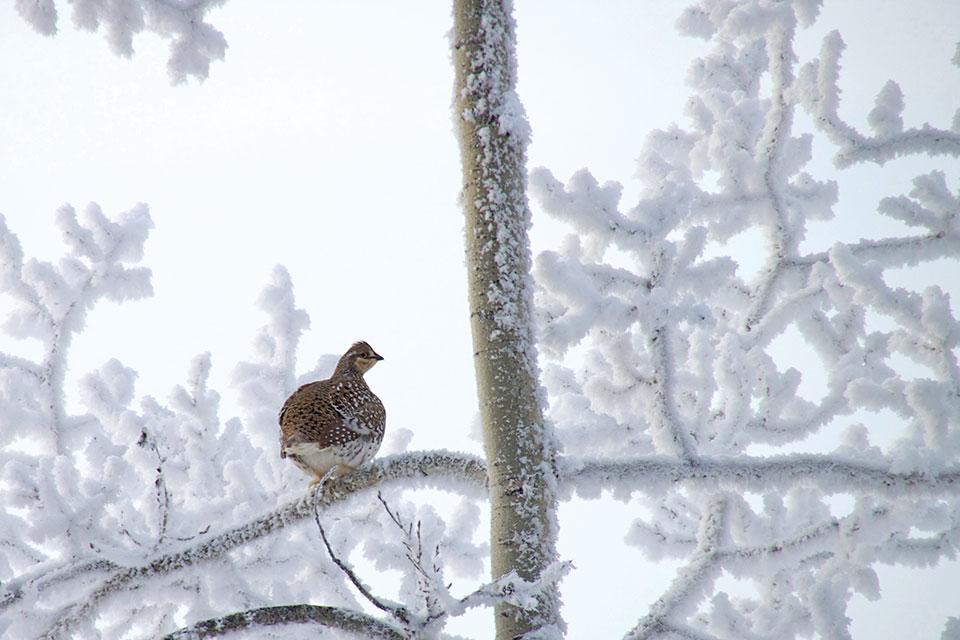The Grouse Hunt

In this story from a snowy Greenland, a woman reluctantly joins her husband in the woods for a grouse hunt. Ready . . . aim . . .
She’s still in bed. She already got up once, but crawled back into bed again, inching her way along the walls, trying to make herself invisible, and she has no idea why, it happened from one day to the next; something has changed, though, and it’s impossible to trace the matter back to whatever triggered it. That stifling sensation in her chest, a weight in her stomach trying to burn its way out.
Why doesn’t she simply want everything to be like it always is, for everyone to do what they always do, she hopping out of bed to feed the children so she and her husband can harness the dogs and be off on the grouse hunt? While standing among the dogs, she tends to glance up at the houses along the road, well aware that although she can’t see her neighbors behind the curtains, they’re there, watching, bitter they’re not in her place, that they’re not married to her husband, and that they’re not heading off into the great white wilderness with him.
She doesn’t want to go. She’s a dog on a chain, conscious she’s done something wrong but without a clue what it might be. He could take one of their sons instead, or better yet both boys, so she could have a little peace, or in any case the youngest; the oldest can look after himself. Their youngest son would love to go, it’s what he begs for every time his father heads out; fact is, you’d think the only thing filling his mind was how he might come to perch on the sled and speed off down the trail in search of birds.
She hears them shouting in the kitchen, quarreling no doubt. Then he lifts his voice, a door slams, and all is silent.
He won’t take the boys. It’ll end with her, and she has it coming. No matter how she moves, no matter where she moves, she’s in his line of sight. No, that can’t be true. She’s tried observing his looks, his words, and every time she draws the same conclusion: he’s not watching her, it’s only in her mind, and she needs to stop thinking such thoughts, nothing is wrong, everything is like it’s always been. But still she feels out of sorts. All she wants is to sink through the mattress, down beneath the bed, and never come out again. Yet why can’t she just think about something else?
She heads down to the kitchen; the boys have already run out. She can see them outside the window, the youngest in rubber boots and a sweater; he’s standing and bawling on top of the snowdrift on the roadside. The impulse to go out and pick him up flutters through her and disappears. Farther off she can see the older boy’s back. He’s leaving.
Crumbs cover the table. What’s left of the bread is beside the bag. She butters the wedge and eats it standing. The house is comfortably still, the snow dampens sounds from without, and the double-paned windows block the rest. Nonetheless, she can still hear the dogs, their restless yapping; her husband must be down with them. The little one can stay with the neighbors while they’re gone, the old couple is always home, and they know her children.
She works silently beside her husband while they ready the sled, retrieve the rifles, strap them tight on top of the skin. The dogs are excited, in their eagerness they tumble over and around each other, they tangle up the traces before they’ve even started off. She casts a stolen glance at his face, but there’s nothing to see, just the usual concentration. And now he frees the sled, time starts, the dogs cast themselves forward in the harness, and they glide through the city; when finally she looks around, the houses are already behind them, and they’re on their way out into the country to hunt for grouse; soon they’ll be heading home again.
They follow the trail through the first two valleys but leave it at a place where they’ve found grouse before. When they reach a bare patch of rough stones that are free of snow, he signals to the dogs to stop. In a snap he’s pushed the sled onto the patch of ground and stowed the traces beneath the rudders. If the dogs suddenly decide to head home without them, they’ll have to pull the sled right along behind. Right now they’re simply resting in a heap, a pack of tame predators, a lead dog, the subordinate working animals, and the bitch. It’s him that governs them all, he leads with violence, a wolf pack obedient to the whip, the stick, the boot, submissively cringing and creeping, and in the next instant, when his back his turned, grimly, greedily ravenous.
He’s already shouldered his rifle.
The morning’s unrest is a warm weight inside her, she’s tired, but she loosens the ties on the sled and pulls out her own rifle. A single-barreled shotgun, it’s still gleaming and lacks the salt and water corrosion that all his guns have.
She touches the shaft; snow from her mittens easily brushes off the lacquered surface.
At the bottom of the sled bag on the stanchion she finds the box of cartridges and stuffs them in her pockets. Behind them the valley is open; the large flat parenthesis that is their sled tracks a regular line through it. She can’t see the city; it disappeared entirely after the river.
A pang of loss, a diffuse and directionless longing, as if something has ended. And there, in its place, is what she finds in the mountain before her: a magnitude without purpose. The only thing one can say of a mountain is that it continues to rise and rise, up to a certain point, at which time it falls and becomes a slope, perhaps a valley, at least for a time, only to rise at some juncture and become a mountain again.
Her large calf muscles contract, the balls of her feet tingle, and suddenly all she wants to do is run, back to the dogs, to feel her legs working beneath her and the sweat springing from beneath her thick clothes.
Resolutely, she focuses on her hands and the mittens covering them. She sewed the outer layer from sealskin using a leather needle and linen thread. Her finger gloves stick out beneath the leather; it helps to concentrate on her fingers, to think about them, they’re strong, they can grip tight and hold fast.
They start to walk, she follows behind. She can see his back. Gradually they move deeper into the countryside, and now they’re climbing straight toward the sky, a light blue and light red above the mountain’s sharp outline. As usual they find the best place to ascend; somewhere not too steep and where the snow is hard-packed. The snow is glittering turquoise and yellow, and shadows hang like violet tufts. If she looks in the opposite direction, the picture is entirely different, a bluish-gray blanket floats over the sea and pushes toward land. The weather shifts so quickly.
The higher they go, the more her mind tingles. Suddenly, she can’t banish the thought that in their absence the dogs have taken off, that they’ve disappeared and abandoned them out here. She’s convinced they’re lost and that they’ll have to find somewhere to spend the night in the open with a storm on the way. She’ll be forced to creep beneath his arms for warmth. The odor of his breath, a snow cave, freezing fingers. And the children back home, the little one at the old couple’s, he’s coughing, he should’ve had more clothes on, a snow suit, the thick boots.
Farther up they halt and open the necks of their anoraks. She’s soaked and has goosebumps. He retrieves a chocolate bar from his waist bag and divides it in two with his pocketknife. The knife has just been sharpened. The blade slices through the caramel as if it were made of pudding, and suddenly he crouches down.
Silently she shrugs her gun from her shoulder; in a single motion she falls to her knee behind the rock and brings the gun to her cheek.
“Up there,” he says, nodding toward a rise where heather and a couple of black stones stick up from the snow.
Beside the largest rock, which is so rectangular it looks like it’s been sliced perpendicular, are two white spots in the heather.
Silently she shrugs her gun from her shoulder; in a single motion she falls to her knee behind the rock and brings the gun to her cheek. Her body works of its own accord, it knows exactly what to do, she doesn’t have to think. A little beyond them two grouse are sitting and pecking for old berries.
Her fingers are no longer stiff, she unsecures the gun and casts a last glance at her husband before focusing on the prey and taking aim.
The sound of a gunshot. She watches a headless grouse collapse into the heather. She can also smell gunpowder. But she misses the shock of the gun’s recoil against her shoulder.
“I took it,” he says between his teeth.
His face. His jaws work, he still has his rifle at his cheek and he takes aim at the other grouse, which sits as if paralyzed. Suddenly, it flaps loudly over the patch of snow and right by them.
“Damn,” he hisses. “Why didn’t you shoot?”
She simply stays on her knee with her gun in position and stares.
“I couldn’t,” she says, cringing.
She lets him retrieve the prey. At a distance he could be any man bending down for the bird, gathering it up and tying it fast to the leather cords on his belt so it can dangle there. It’s late winter, the snow that appears like an open and inviting path is nonetheless full of pitfalls, he sinks up to his knees multiple times, and she leans back against the rock and readies the rifle in her hands. Over the barrel she can see him staggering toward her. The crosshairs cover his breast.
A wave breaks inside her, she needs to pee, warmth spreads from her groin up to her stomach and then to her chest, everything goes still around her, her ears are ringing, and before her is nothing, she’s completely white inside; there’s only the sound of the gun sliding onto the stone and landing with a dull thud in the snow.
They take three more grouse, and not once does he ask why she’s no longer trying. He traverses the countryside, up and down mountainsides, and she’s convinced she scrambles after him, even though she’s neither out of breath nor falling behind. She’s sweating that clammy sweat, the wind is beginning to blow, the air is suddenly warm, a foehn.
On a peak she spies a hare. Her eyes follow its silent movements. She lets it disappear behind a rise.
“We should turn back,” she says. “The weather’s getting bad.”
“I’m not finished,” he says.
“Still, we should turn back,” she says. “I’m turning back now.”
He gives her a look, a long, silent stare. “Then let’s do it. If that’s what you want.”
Translation from the Danish
By Kerri Pierce












